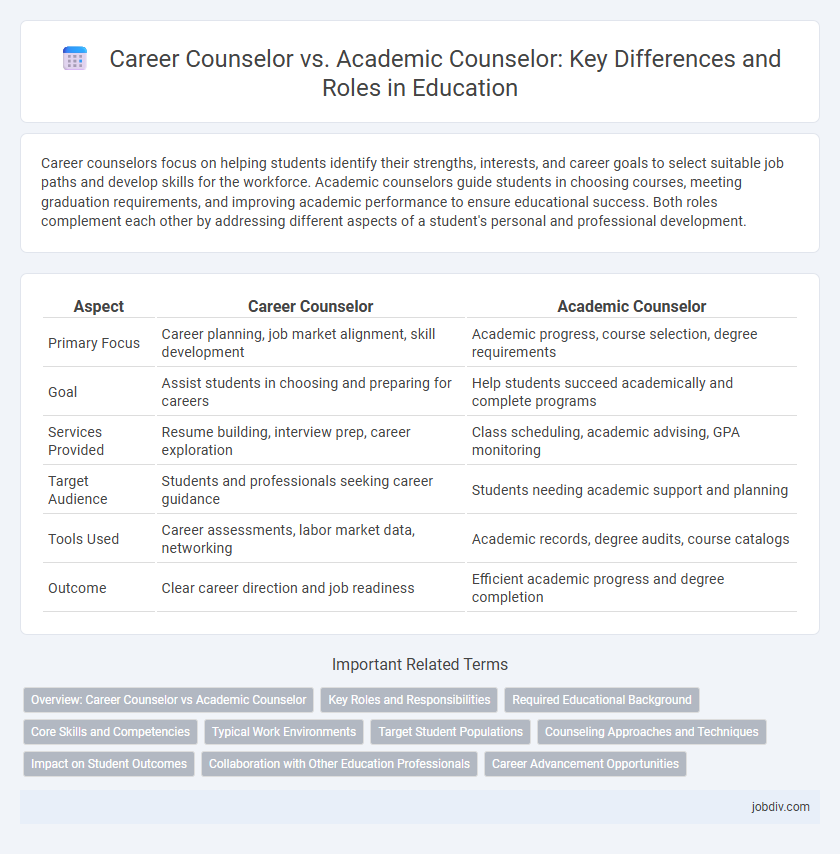Career counselors focus on helping students identify their strengths, interests, and career goals to select suitable job paths and develop skills for the workforce. Academic counselors guide students in choosing courses, meeting graduation requirements, and improving academic performance to ensure educational success. Both roles complement each other by addressing different aspects of a student's personal and professional development.
Table of Comparison
| Aspect | Career Counselor | Academic Counselor |
|---|---|---|
| Primary Focus | Career planning, job market alignment, skill development | Academic progress, course selection, degree requirements |
| Goal | Assist students in choosing and preparing for careers | Help students succeed academically and complete programs |
| Services Provided | Resume building, interview prep, career exploration | Class scheduling, academic advising, GPA monitoring |
| Target Audience | Students and professionals seeking career guidance | Students needing academic support and planning |
| Tools Used | Career assessments, labor market data, networking | Academic records, degree audits, course catalogs |
| Outcome | Clear career direction and job readiness | Efficient academic progress and degree completion |
Overview: Career Counselor vs Academic Counselor
Career counselors guide individuals in choosing career paths by assessing interests, skills, and labor market trends, offering advice on job search strategies and professional development. Academic counselors focus on educational planning, helping students select appropriate courses, meet graduation requirements, and navigate academic policies to achieve their educational goals. Both roles support personal growth, but career counselors emphasize employment outcomes while academic counselors prioritize academic success and progression.
Key Roles and Responsibilities
Career counselors guide individuals in identifying suitable career paths, developing job search strategies, and enhancing skills such as resume writing and interview techniques. Academic counselors focus on course selection, academic planning, and ensuring students meet graduation requirements while addressing learning challenges. Both roles collaborate to support the overall personal and professional development of students.
Required Educational Background
Career counselors typically require a master's degree in counseling, psychology, or a related field, often coupled with certification such as the National Certified Career Counselor (NCCC). Academic counselors usually hold at least a bachelor's degree in education, counseling, or a closely related area, with many institutions preferring a master's degree for advanced advising roles. Both roles often mandate supervised clinical experience or internships to ensure practical knowledge in their respective domains.
Core Skills and Competencies
Career counselors specialize in skills such as labor market analysis, resume building, and interview preparation, honing competencies in career assessment tools and job placement strategies. Academic counselors focus on educational planning, course selection, and academic progress monitoring, emphasizing expertise in curriculum requirements and student developmental psychology. Both roles require strong communication, empathy, and problem-solving abilities, yet their core skills align distinctly with career development or academic success frameworks.
Typical Work Environments
Career counselors typically work in corporate settings, employment agencies, and vocational rehabilitation centers to assist clients with career planning and job search strategies. Academic counselors are commonly found in educational institutions such as high schools, colleges, and universities, providing guidance on course selection, academic performance, and college admissions. Both roles require collaboration with students and professionals but differ significantly in their work environments and primary focus areas.
Target Student Populations
Career counselors primarily support high school and college students planning entry into the workforce by focusing on career exploration, resume development, and job search strategies. Academic counselors cater to students at all levels, including K-12 and higher education, assisting with course selection, academic performance, and degree requirements. Both roles aim to enhance student success but serve distinct needs tailored to different stages of educational and career development.
Counseling Approaches and Techniques
Career counselors employ goal-oriented techniques such as vocational assessments, personality tests, and labor market analysis to guide clients in making informed career decisions. Academic counselors utilize developmental approaches focusing on academic planning, study skills, and time management strategies to support students' educational progress. Both types of counselors emphasize personalized guidance but differ in the application of tools and frameworks tailored to career development versus academic achievement.
Impact on Student Outcomes
Career counselors enhance student outcomes by aligning individual strengths and interests with labor market trends, leading to higher job placement rates and career satisfaction. Academic counselors improve graduation rates and academic performance through personalized course planning, academic support, and skill development strategies. Both roles significantly contribute to student success by addressing distinct yet complementary aspects of educational and professional growth.
Collaboration with Other Education Professionals
Career counselors collaborate with academic counselors, teachers, and industry experts to align students' career goals with academic performance and labor market trends. Academic counselors work closely with school psychologists, special education staff, and faculty members to tailor learning plans that support student success and personal development. This interdisciplinary cooperation ensures comprehensive guidance addressing both educational progress and future career opportunities.
Career Advancement Opportunities
Career counselors specialize in identifying career advancement opportunities by analyzing labor market trends, skill requirements, and individual strengths to guide clients toward viable job paths and professional growth. Academic counselors focus on educational planning, ensuring students fulfill curriculum requirements and select courses aligned with their long-term academic and career goals. The integration of career counseling with academic advising enhances students' readiness for workforce entry and supports strategic career development.
Career Counselor vs Academic Counselor Infographic

 jobdiv.com
jobdiv.com